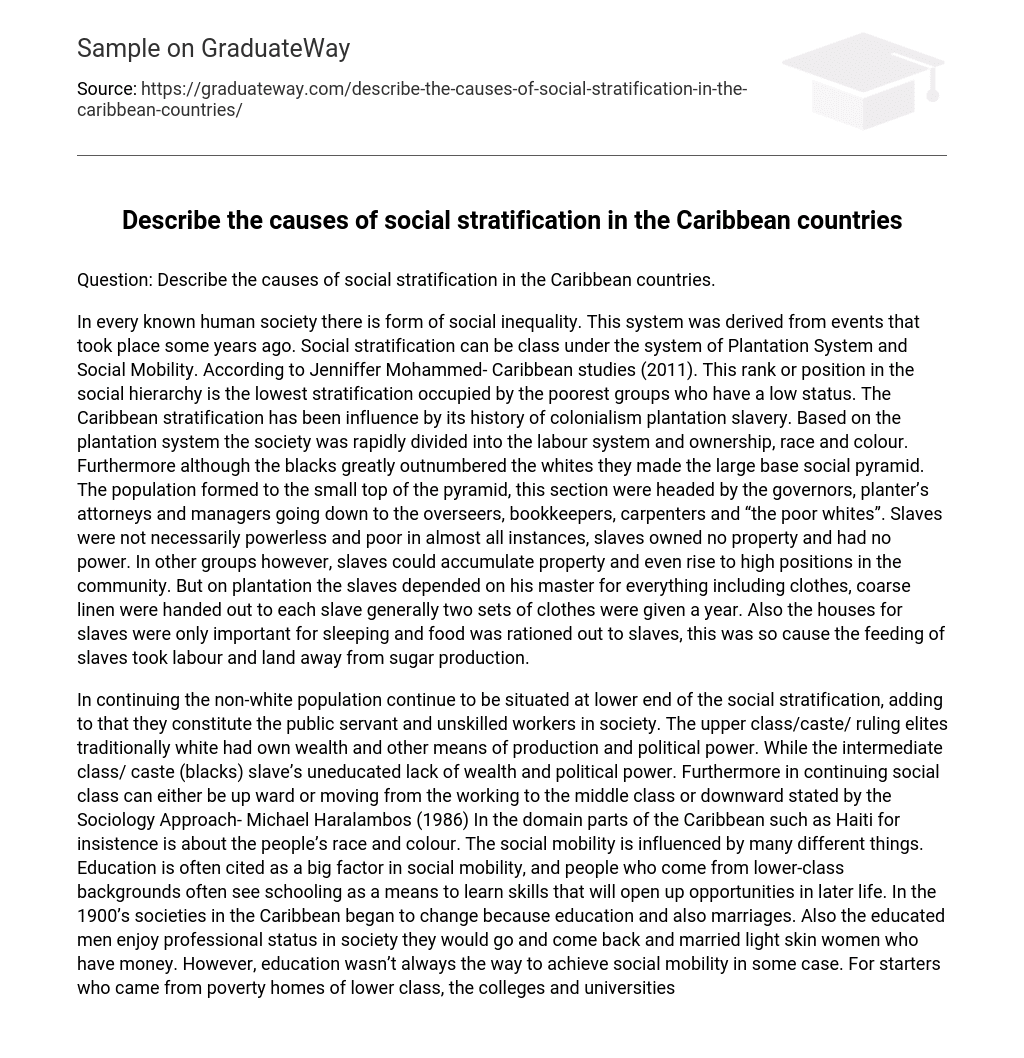In every known human society there is form of social inequality. This system was derived from events that took place some years ago. Social stratification can be class under the system of Plantation System and Social Mobility. According to Jenniffer Mohammed- Caribbean studies (2011). This rank or position in the social hierarchy is the lowest stratification occupied by the poorest groups who have a low status.
The Caribbean stratification has been influence by its history of colonialism plantation slavery. Based on the plantation system the society was rapidly divided into the labour system and ownership, race and colour. Furthermore although the blacks greatly outnumbered the whites they made the large base social pyramid. The population formed to the small top of the pyramid, this section were headed by the governors, planter’s attorneys and managers going down to the overseers, bookkeepers, carpenters and “the poor whites”. Slaves were not necessarily powerless and poor in almost all instances, slaves owned no property and had no power.
In other groups however, slaves could accumulate property and even rise to high positions in the community. But on plantation the slaves depended on his master for everything including clothes, coarse linen were handed out to each slave generally two sets of clothes were given a year. Also the houses for slaves were only important for sleeping and food was rationed out to slaves, this was so cause the feeding of slaves took labour and land away from sugar production.
In continuing the non-white population continue to be situated at lower end of the social stratification, adding to that they constitute the public servant and unskilled workers in society. The upper class/caste/ ruling elites traditionally white had own wealth and other means of production and political power. While the intermediate class/ caste (blacks) slave’s uneducated lack of wealth and political power. Furthermore in continuing social class can either be up ward or moving from the working to the middle class or downward stated by the Sociology Approach- Michael Haralambos (1986)
In the domain parts of the Caribbean such as Haiti for insistence is about the people’s race and colour. The social mobility is influenced by many different things. Education is often cited as a big factor in social mobility, and people who come from lower-class backgrounds often see schooling as a means to learn skills that will open up opportunities in later life. In the 1900’s societies in the Caribbean began to change because education and also marriages.
Also the educated men enjoy professional status in society they would go and come back and married light skin women who have money. However, education wasn’t always the way to achieve social mobility in some case. For starters who came from poverty homes of lower class, the colleges and universities charge exorbitant enrolment fees was deter from of certain social classes.
The quality of a school can also increase the price of living in a certain area, which can then indirectly exclude some pupils from managing to progress socially education. Therefore as far as downward social mobility goes, economic rising unemployment is major contributors to the growth of the lower social classes. Furthermore in Jamaica colour is still a major issue , that’s why individual have start to detune themselves of a different such as” bleaching”, having a light skin means having a kind of social capital or beauty.
In continuing the way you behave also determine your social stratification if your loud with no behaviour, it’s classified as you’re not a lady. This beauty then can be used to access other kind of capital such as economic or education purposes. Lightening skin practice has also increasing ones opportunity for success.
This practice is based on the social level in Jamaica that is causing people to want to reach or be classified as upper class individuals, stated by Hunter (2005). Social stratification pursued individual of lower class to work harder to move up in society. These people had to save their money in order to build homes to come out of the poverty stages, to be place in the middle class.
In addition of conclusion stratification Social Stratification is the way in which large numbers of people are divided. They are divided into what is called layers. They are often grouped together into these layers based upon their property, power, and prestige. This separation, or inequality, is more distinct in some societies then others, but social stratification is universal especially in the Caribbean.
Slavery is probably the most known under social stratification. This was so cause on the plantation system the society was rapidly divided into the labour system, ownership and mainly race and colour although black slaves outnumbered the white, the white took decision and make social pyramid. In continuing although the social pyramid changed over the years there are some trace in Caribbean society still.





